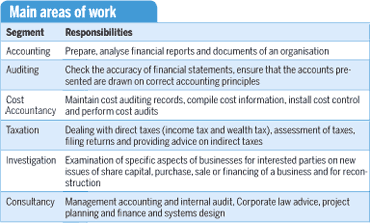 | « Back to article | Print this article |
Careers: 'Indian CAs will lead from the front'
If the words 'Chartered Accountant' conjure up an image of a bespectacled person rummaging through company balance sheets, then brace yourself for a professional who is fast becoming an indispensable asset to companies. The placement figures according to ICAI this year are proof enough.
The first phase of placements at the institute's five metro campuses (out of 15) in the first week of March saw 320 candidates being picked up by companies on Day 1. The big four consulting and accounting firms namely -- E&Y, PWC, KPMG and Deloitte -- hired students directly from training institutes in smaller cities such as Jaipur, Indore, Chandigarh and Ahmedabad, a move that was partly motivated by cost factors, too.
The number of CAs on the rolls of ICAI, is currently a whopping 660,000 (up from 3.5 lakhs in 2008), showing that the course is much in demand, owing to its increasing relevance to the current business environment.
Beyond accountancy
CAs, today, have definitely carved a niche of their own, as compared to those with an MBA. While an accountant does the manual job of preparing the data and keying it into the computer to prepare a financial statement, it is the CA who interprets the same. MBAs on the other hand are hired in sales and marketing to deal with clients wherein they utilise their communication skills, in most cases. Abhinav Suri who has worked with the corporate banking division of ICICI Bank, Delhi, says: "Companies rely on a CA's opinion; he or she is seen as a key strategist when it comes to the company's finances."
Today, CAs are recognised as professionals with a robust knowledge of finance who have the ability to take decisions that can impact the future of the company. This is even more relevant in a dynamic global environment with an increasing need to manage risk, given the fact that many companies struggled with the recession last year. "As opposed to finance professionals, who take care of the financial requirements of the company, the CA looks for the future implications and cost involved in it," says Sharad Maheshwari, a partner with a CA firm in Indore.
With finance being the backbone of any organisation, a CA with in-depth knowledge of costing, funding, financing, accounting, structuring and compliance and also an understanding of the taxation regime and accounting methods, is a key person to count upon.
A rigorous course
Though it involves self-study, the CA programme is intensive and clearing all three levels needs persistence. Students can register after class 10 but are eligible to take the Common Proficiency Test (CPT) only after they appear for their class 12 exams. This is followed by Intergrated Professional Certificate Course (IPCC) followed by the Final Course.
Registration for CPT is open throughout the year and exams are conducted in June and December. However, exams for IPCC and Final are conduced in May and November. To address the need to equip the CA with better communication skills, all those who pass the Final exam now have to complete a 15-day course in general management and communication skills.
The three-year articleship (on-the-job apprenticeship) after completing IPCC is what distinguishes a CA from an MBA or an accountant who might learn the subjects but may lack the hands-on experience and practical application of concepts for daily situations.
Although the course fees are reasonable, the cost is much more for coaching classes in all subjects. The course is also reviewed periodically. In December 2008, the Accounting Technician Course was introduced to meet the huge demand for second tier accounting professionals for large, small and medium enterprises. Class 12 students can clear this exam and work for a year to be qualified as accounting technicians.
The CA's role gets meatier
No one can claim to understand company balance sheets better than a CA. He primarily ensures that the financial transactions of an organisation are maintained according to the law. He also tracks cost of management of the company and manages tax matters.
All companies registered under the Companies Act, are required to get their accounts audited only by practicing chartered accountants, thus making them an integral part of the financial departments. While in a company, the CA is responsible for preparing data, in practice he is the person who has to check the accuracy and authenticity of the data prepared by somebody else.
"For a practicing CA, the responsibility involves audit and advisory. For example, if the CA is the statutory auditor of a company, then he or she is responsible for giving an opinion on the credibility, fairness of the accounts to the shareholders and other stakeholders. On the other hand, if he is an internal auditor or consultant to the company, his or her primary responsibilities are to the management and are similar to that of a finance manager/ controller of the company," says K Kalyansundaram, founder and partner, Kalyansundaram and Associates, a Chennai-based auditing and consulting firm.
From generalist to specialist
The scope of the CA's job is fast moving beyond the traditional role. They are assuming advisory roles conducting due diligence of companies involved during mergers and acquisition (M&A) deals. From being generalists, they now specialise in service tax, international taxation, transfer pricing, information systems audit, fraud detection (insolvency, bankruptcy), risk management, ERP, US GAAP, IFRS, WTO representations, property-related matters, investment banking, transaction advisory to name a few.
The fact that CAs have considerable knowledge can also prove to be a challenge! They are looked upon as trouble shooters and solution providers. "The biggest challenge is to meet the high expectations of employers who expect us to manage any kind of critical profile," says Tamalika De, who works as a senior manager (Operations) with ICICI Securities, Mumbai. Her responsibilities include supervising and reviewing daily accounting of various exchange related trades and setting new processes having financial impacts in place, a new area for CAs.
CAs also act as arbitrators who settle disputes and as executors under a will or trust in order to carry out the administration of an estate or settlements. They are also engaged in activities like markets research, budget planning, working capital management, inventory control, policy planning, securities consultancy, registrar of issues of securities etc.
Software companies and KPOs also hire CAs as finance managers, financial controllers and financial advisors. They can also be placed in government sector in roles such as director (finance), chief executive and head of the department of the accounts.
A well-paid profession
A fresh CA can earn a starting salary of Rs 30,000- 50,000 per month, depending on the company and the sector he is hired into, in sharp contrast to the meagre stipend (Rs 1,000-5,000) earned during an articleship. The lucrative salaries offered by international audit and consulting majors such as PWC, Ernst & Young, KPMG and Deloitte, also attract many aspirants.
"Salary offered depends on whether the candidate cleared the CA exam in the first, second or third attempt or is a rankholder. Past educational qualifications and communication skills are also selection criteria for recruiters," says Sunil Goel, director, GlobalHunt India, an executive search firm.
Most CAs register for placements organised by ICAI in March at campuses across the country. This year the average salary offered to freshers was Rs 6.58 lakh. One-third of the candidates accepted jobs in the banking sector, making it the top-most recruiter.
Most CAs opt for jobs but some choose to practice either on their own or with smaller CA firms. "In a job you get good packages along with a brand name. With a practice, one has to struggle initially. However, it does offer good exposure and returns after some years," echoes Parul Gupta, who works as a partner with a CA firm in Delhi.
Working for a smaller firm could fetch you between Rs 25,000- 40,000 per month. Be prepared to battle it out if you plan to start your own practice from scratch. It may fetch you a salary ranging from Rs 5,000 to 25,000 per month.
The caveat though is not to be led by the pay package. Instead focus on the learning during your tenure in either a CA firm or a job of your choice.
The future
ICAI is in the process of finalising accounting standards in convergence with IFRS (International Financial Reporting Standards) expected to be ready by June 2010. As a part of the move, all companies will be required to follow the IFRS converged Indian Accounting Standards from April 1, 2011. The institute has started a massive exercise to train its members in industry as well as in practice.
"As the Indian economy prepares itself for a phase of explosive growth and becomes an aggressive player in foreign markets, it will be the Indian CAs who will lead from the front," concludes Kalyansundaram.



